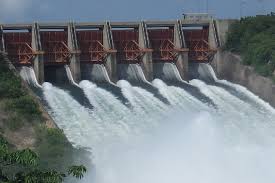The cost of a multi- purpose dam project to be constructed at Pwalugu in the Upper East Region of the Republic of Ghana by the Akufo-Addo administration has generated controversy between the Minority and Majority Members of Parliament.
While the Minority believes the cost of the project is on the higher side and needed renegotiation, the Majority members, on the other hand, see nothing wrong with the cost, thus, rejected call for the renegotiation.
President of Ghana, Nana Akufo-Addo, on November 29, 2019, cut the sod for the construction of the Pwalugu multipurpose dam project.
The US$993 million project, which is being financed solely by the government, will consist of three main components namely, the construction of a hydropower plant, the construction of a solar farm and the establishment of an irrigation scheme covering an area of some 25,000 hectares.
The 60MW power generation component alone is expected to cost the taxpayer some US$366 million.
But, the Minority legislators believe the project is very expensive to the Ghanaian tax payer.
The Minority Leader, Haruna Iddrisu, in an interview with Accra-based Citi FM, said: “I think the proper thing will be for the Committee of Finance and the Committee of Mines and Energy to re-examine this particular request, other than that, you cannot spend 366 million dollars on 60 megawatts of electricity…Ideally, I made a comment that the appropriate thing will be for the committees to re-examine it. We do not just look at terms and conditions but we look at its impact on the economy and the Ghanaian people.”
However, the Majority Leader, Osei Kyei Mensah-Bonsu, responding to concerns of his colleague, said the Minority’s concerns are misplaced.
He argued that the scope of the work to be done warrants the budgeted amount for the project.
“The Minority Leader raised some issues about the cost. On the face of it, one could agree except that when we had to do this Komenda sugar factory, it didn’t relate just to the factory. It related to the parcels of lands that were procured for the cultivation of sugarcane. It is the same thing for the Pwalugu factory. The amount procured is not only for the establishment of the factory but also the procurement of parcels of land and the irrigation to be relayed to all corners of the parcels of land,” he said.
Source: www.energynewsafrica.com
















